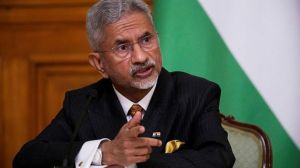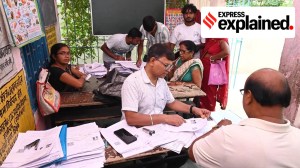Many layers of a hostage crisis
The hostage crisis in Iraq is evolving into an interplay of larger forces in which the three Indians are cornered, in King Lear’s cosmi...

The hostage crisis in Iraq is evolving into an interplay of larger forces in which the three Indians are cornered, in King Lear’s cosmic framework, as ‘‘poor, forked’’ creatures.
The 1,60,000 US troops (some British too) are now entrenched in about 16 cantonments, mostly built by the ousted regime. These soldiers need supplies — food (including lobster and Alaskan king crab), clothes, boots, uniforms, ammunition, engineering goods. Haliburton and the US Army Corps of Engineers, among others, have sub contracted logistics to billion dollar groups like KGL transport in which Kuwait’s royal family also has stakes.
A spate of hostage-taking has slowed down or snapped supply lines from Saudi Arabia, Jordan, Turkey. The pressure now is on Kuwait. Spain, Philippines, Nicaragua, Honduras have pulled out their troops. Hungarians and others are weighing their wings for early flight.
US Secretary of State Colin Powell’s much photographed embrace of Prince Saud al Faisal, Saudi foreign minister, in Riyadh, had created an illusion of a possible Islamic force. But would this force replace the Americans? Before the US elections? Not quite. Even Pakistan said no.
If a major transport group from the most loyal of all Arab states (Kuwait has even banned the screening of Michael Moore’s Fahrenheit 9/11) were to back away from contracts which are the lifeline for US troops, signals to all ‘‘Arab allies’’ would be negative. Supply lines must be kept open, at least past November 2, polling day in the US.
Secondly, the only way Prime Minister Iyad Allawi (once a great friend of Saddam and cast in the same mould) can establish some credit with Iraqis is by falling back on the support of the old Baath establishment. Mukhaberat or Saddam’s secret service has been pressed into service again. Allawi is targeting Islamic militants, call them Al Qaeda if you must. He is fighting the ‘‘imported’’ elements. The resistance against occupation, of which the hostage takers are a part, are not being challenged. This has given rise to rumours in Baghdad of there being differences between Allawi and US Ambassador (viceroy) John Negroponte. There are other reasons for this wedge. The US is not adhering to the agreement which brought the interim Iraqi government into being. Any major military action must first be cleared by the interim government. But the Americans are bombing Fallujah with impunity. Little wonder, the hostage takers (probably Baathists Islamised in anger) have asked KGL to pay compensations for the victims of Fallujah.
Interestingly, the Mukhaberat is looking the other way. When Narendra Singh of the PCP, an Indian company popular with Iraqis, mobilised the services of Saad al Assadi of the powerful Assadi tribe, to visit Sheikh Hisham al Dulaimi, they had one more person with them — the second most important man in Black Banners, the hostage takers. All of this within stone’s throw from Firdous square, beyond which lies the all-powerful Green Zone.
Black Banners insisted that the Indian government apologise for having described the group as bandits. Two drafts, signed by Ambassador Brij Tyagi, were handed to the Arab networks. The arrival of Talmiz Ahmad in Baghdad as the MEA’s envoy has given just the right signals to the Iraqis: any harm to the Indians will undermine the popular mood in India against occupation.
Telephonic communication between Baghdad and Kuwait was proving difficult. At Sheikh Dulaimi’s behest, KGL is sending Adil Ali to Baghdad with a broad mandate to close the negotiations. Dulaimi is keen to succeed; he is a candidate for the Speaker’s job in the constituent assembly.
There are about 5000 Indians, mostly from Kerala, working in various US bases. There are 1,700 in a base near Fallujah. Indian agents placed them with major contractors in countries on Iraq’s rim. These contractors had multi million dollar contracts with US suppliers to the Occupation troops.
Iraqis know the Indians are politically neutral. They are there for salaries seldom in excess of $ 750 per month. No other nationality has such widespread acceptability, indeed, affection. Indeed, Americans too find them the most trustworthy.
This is true in all of West Asia but particularly in Iraq. Remember, Iraq defied all pressures and stood by India on Kashmir since 1973. Iraqis have not known any other stance vis a vis India for over 30 years.
As I have said repeatedly, should, God forbid, any harm come to the Indians it will not, cannot be, Iraqis who will be responsible. The resistance has been infiltrated by Islamic militants and intelligence agencies with agendas far removed from the anti-occupation mujahideen now having tacit support of the Mukhaberat. So many interests crisscrossing Iraq make it a very dangerous, unpredictable place.
Photos
- 01
- 02
- 03
- 04
- 05






























